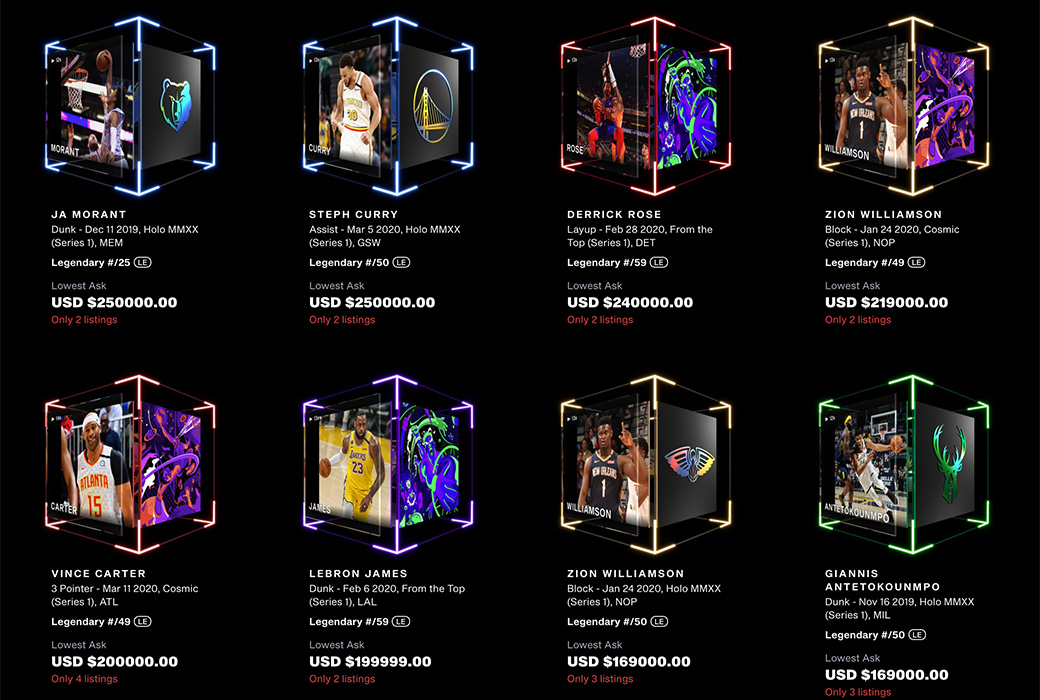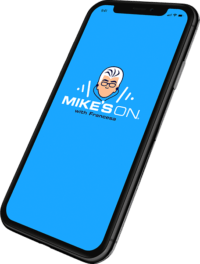The NBA has Top Shot. The NFL is reportedly looking into launching something similar. The sports world clearly understands that there is money to be made in non-fungible tokens.

What are non-fungible tokens? Well, first of all, if you’re cool, you call them NFTs. According to Coinbase, NFTs are “are a special kind of cryptoasset in which each token is unique”.
Most of the cryptocurrencies we are familiar with offer a single thing for a single price. Bitcoin, for instance, was valued just under $60,200 when I started writing this. Before I hit publish though, the price plummeted by 10%. Fork over whatever the current amount is, and you get a single Bitcoin.
With NFTs, you are buying something specific. In the case of Top Shot, your investment gets you a particular highlight. That makes it possible to swing trades and make deals with NFTs in a way that is more akin to an NBA GM than a day trader.
Following so far?
Honestly, me neither, so let’s just get to the question at hand.
Art is sold as NFTs. Albums are sold as NFTs. Any bit of code can be an NFT, so is there a way radio can make money off of the trend?
In order to figure out the answer to that question, I asked my friend Jordan Holberg for help. We went school together from third grade until the end of high school. Fun fact about Jordan: when we were in sixth grade, he once made me laugh so hard I peed my pants.
He was in AP and honors classes. I mostly didn’t do homework. That meant I went to Alabama and he went to NYU. Now, I write about sports media for a living, and he has just started his own company that mints NFTs and cryptocurrency.
He is very smart. I am very dumb. A perfect example of that fact is that when we were exchanging messages and emails about this column and he referenced the SEC, he stopped to make sure I understood that he was talking about the Securities and Exchanges Commission and not the Southeastern Conference.
Full disclosure: I did not, but pretended I did.
Anyway, Jordan explained that the idea of non-fungible tokens is sort of the final evolution that futurists and the Cyberpunk genre had been envisioning for cryptocurrency all along. NFTs themselves are not a cryptocurrency. They are how you invest your cryptocurrency.
I told Jordan that between something like the NBA’s Top Shot and a band like Kings of Leon releasing their latest album as an NFT, they seemed more like something you buy because you are a fan than a strategic investment. Jordan says that it helps to think back to when you were a kid collecting baseball cards.
“Was that about fandom or investing? I certainly remember going to card shows at the Howard Johnson and drooling over a Nolan Ryan rookie card, or placing value on cards with printed errors,” he told me in an email. “Non-Fungible Tokens exist in this very fungible space at the intersection of gaming, social, and finance, and I think it’s fascinating the Internet has facilitated the existence of this new type of entity.”
Okay, so we’re talking about a “you got chocolate in my peanut butter” kind of situation. Sure, NFTs are investments, but the desire to invest in a lot of cases is driven by fandom. That means that entering the NFT market may not be viable for everyone in the sports media industry, but iconic brands like ESPN or local institutions like KFAN in Minneapolis or WFAN in New York may be able to offer fans something in this space.
I asked Jordan what would be a reasonable NFT offer from a sports media brand. I was prepared to hear him mention something like a podcast or the ability to download a show that may not be available to own or have on any other platform. Instead, I was surprised by how familiar his suggestion seemed.
“The first thing that pops into my head is community,” he answered. “It’s dead-simple, at least in relative terms, to create a gated social community experience for NFT holders. It’s like a virtual ticket that isn’t forgeable, could be non-transferable, and has the potential to constantly make money for its issuer.”
That sounds an awful lot like ESPN+ or Mike Francesa’s ill-fated Mike’s On app. I am not saying it is the wrong answer. I don’t even know enough to know if there is a wrong answer. Maybe it speaks to the idea that an NFT can be anything.

The other thing to remember is that before any company can make a fortune on NFTs, it may have to invest a fortune. Take Jordan’s exclusive community. Why is it different than something like an app or a subscription service? Jordan tells me that when NFTs are involved, consumers’ concerns do not stop at status updates or memes. Their investment has them thinking about much more significant factors.
“When it comes to brands, big or small, lawyers have to get involved for sure. Again, NFTs are just digital property rights, but we aren’t digital beings and the world doesn’t exist only on the Internet. Intellectual Property, indemnification, terms of service, all that typical stuff still needs to be considered and isn’t part of anything on the blockchain. That said, it’s as complicated as you want it to be, but because NFTs are forever (if you code them that way), it’s a lot to consider.”
One advantage large, well-known sports media brands could have in the NFT space is the trust factor. I cannot help but think that is part of what has driven Top Shot’s success. Sure, fans love the highlights and the players involved, but the NBA is a global entity. I would guess most NFT believers are more confident in its integrity than some other players in the space. At the very least, people dealing in NFTs can be confident that the NBA has too much to lose to openly run a scam.
Look, I’m not naive. The banking industry, Wall Street, insurance companies, government. I know there are plenty of well-known, long established entities that are perfectly capable of operating in ways that are designed to screw their customers. There is something about fandom though that makes us willing to take on some risk. We want to trust these things and people we have something invested in wouldn’t screw us.
For instance, Jordan tells me that he believes that a large percentage of the NFT art market is being driven by money laundering. “Remember, this is a completely unregulated, brand new industry, and one should never underestimate the greed of others,” he says.
He says that for consumers, the thing to remember is that an NFT is really just a contract. It says that the buyer is exchanging a certain amount of cryptocurrency for a digital entity of some sort.
“These contracts are little programs and each one has been coded by someone. There are contract standards, but it’s up to the consumer to understand what they’re getting into. There’s nothing stopping a smart contract programmer from coding the NFT to say, ‘after 30 days, destroy yourself’. That’s an incredibly daunting task for anyone other than the most technical and hardcore blockchain user, so there’s a certain amount of trust most NFT holders are placing in the system.”

Companies in the media space can achieve plenty of monetary gain from the NFT craze. There is also something to be learned. Perhaps the windfall a media company can receive has less to do with generating income by selling NFTs and more to do with adjusting to the behavior of those participating in the trade.
Jordan doesn’t have predictions on what will happen. What he does know is that NFTs have shown consumers that the model social media networks, company websites, and mobile games have operated under for so long is not the only way consumers can access the content they are looking for online anymore.
“There’s going to be a huge shift between the current attention economy, where creators are paid based on engagement (likes, follows, clicks, eyeballs) and those doing the actual engagement get nothing other than their data mined and sold, to a participation economy, where everyone is compensated and has a stake in whatever it is they’re engaging with. If NFTs are based on crypto and part of a larger whole, and they have value assigned to them, and those NFTs can be bought, sold, and traded, the more compelling their use-cases are, the more functionality they provide and active the community, the more monetary incentives, policy, and governance can be created to compensate and incentivize participation.”
Technology is a constantly evolving thing, so each generation’s expectation of entertainment changes. Think about social media. The idea of being able to send a message to your favorite player after a game and the potential for them to respond directly to you was something that existed only in our dreams when we were teenagers. It makes sense then that the idea that a fan should get something more for their investment than just a newsletter or t-shirt is coming. It’s an expectation sports media companies should be thinking about right now, so that they aren’t the last ones into a flooded marketplace.

“Crypto/NFTs have opened up a whole new world of what it means to be a consumer of entertainment and culture, and, for the moment, the sky’s the limit,” Jordan tells me. “We are very early.”

Demetri Ravanos is a columnist and features writer for Barrett Media. He is also the creator of The Sports Podcast Festival, and a previous host on the Chewing Clock and Media Noise podcasts. He occasionally fills in on stations across the Carolinas in addition to hosting Panthers and College Football podcasts. His radio resume includes stops at WAVH and WZEW in Mobile, AL, WBPT in Birmingham, AL and WBBB, WPTK and WDNC in Raleigh, NC.
You can find him on Twitter @DemetriRavanos or reach him by email at DemetriTheGreek@gmail.com.







